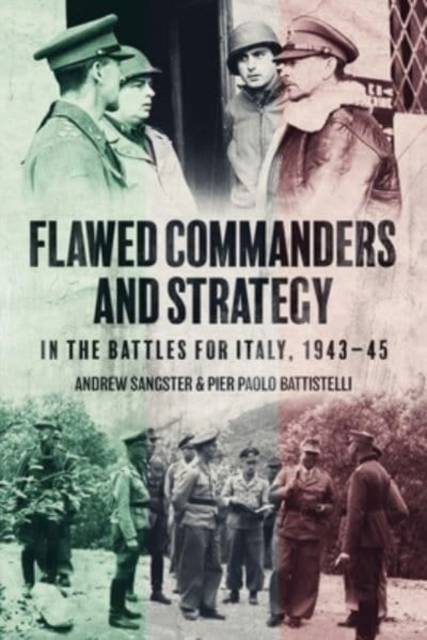
- Afhalen na 1 uur in een winkel met voorraad
- Gratis thuislevering in België vanaf € 30
- Ruim aanbod met 7 miljoen producten
- Afhalen na 1 uur in een winkel met voorraad
- Gratis thuislevering in België vanaf € 30
- Ruim aanbod met 7 miljoen producten
Zoeken
Flawed Commanders and Strategy in the Battles for Italy, 1943-45
Andrew Sangster, Pier Paolo Battistelli
Hardcover | Engels
€ 53,45
+ 106 punten
Omschrijving
The flawed leadership of the five senior military commanders in the Italian campaign led to lost lives and squandered opportunities.
Wars never run according to plan, perhaps never more so than during the Italian campaign, 1943-45, where necessary coordination between the different armies added additional complexity to Allied plans. Errors in the strategies, tactics, the coalition tensions, and operations at campaign command level can clearly be seen in firsthand accounts of the period. This new account examines the Italian campaign, from Sicily to surrender in 1945, exploring the strategy, intentions, motives, plans, and deeds. It then offers a detailed insight into the five commanders who led the battles in Italy--the two British commanders, Montgomery and Alexander; two American, Patton and Clark; and the leading German commander, Field Marshal Kesselring.
Their personal notes and accounts, taken alongside archival material, provides some surprising conclusions--Montgomery was not quite the master of war he is portrayed as; Patton had serious flaws, exposed by wasting men's lives to save a relative and overlooking the shooting of prisoners of war; Clark lost lives to bolster his image; Alexander the gentleman was far too vague to be effective as a senior leader. Meanwhile, condemned war criminal Kesselring appears to be the most efficient and also, like Alexander, one of the most popular leaders.
Wars never run according to plan, perhaps never more so than during the Italian campaign, 1943-45, where necessary coordination between the different armies added additional complexity to Allied plans. Errors in the strategies, tactics, the coalition tensions, and operations at campaign command level can clearly be seen in firsthand accounts of the period. This new account examines the Italian campaign, from Sicily to surrender in 1945, exploring the strategy, intentions, motives, plans, and deeds. It then offers a detailed insight into the five commanders who led the battles in Italy--the two British commanders, Montgomery and Alexander; two American, Patton and Clark; and the leading German commander, Field Marshal Kesselring.
Their personal notes and accounts, taken alongside archival material, provides some surprising conclusions--Montgomery was not quite the master of war he is portrayed as; Patton had serious flaws, exposed by wasting men's lives to save a relative and overlooking the shooting of prisoners of war; Clark lost lives to bolster his image; Alexander the gentleman was far too vague to be effective as a senior leader. Meanwhile, condemned war criminal Kesselring appears to be the most efficient and also, like Alexander, one of the most popular leaders.
Specificaties
Betrokkenen
- Auteur(s):
- Uitgeverij:
Inhoud
- Aantal bladzijden:
- 288
- Taal:
- Engels
Eigenschappen
- Productcode (EAN):
- 9781636243122
- Verschijningsdatum:
- 22/02/2023
- Uitvoering:
- Hardcover
- Formaat:
- Genaaid
- Afmetingen:
- 154 mm x 232 mm
- Gewicht:
- 476 g

Alleen bij Standaard Boekhandel
+ 106 punten op je klantenkaart van Standaard Boekhandel
Beoordelingen
We publiceren alleen reviews die voldoen aan de voorwaarden voor reviews. Bekijk onze voorwaarden voor reviews.











